netty写Echo Server & Client完整步骤教程(图文)
1.创建Maven工程
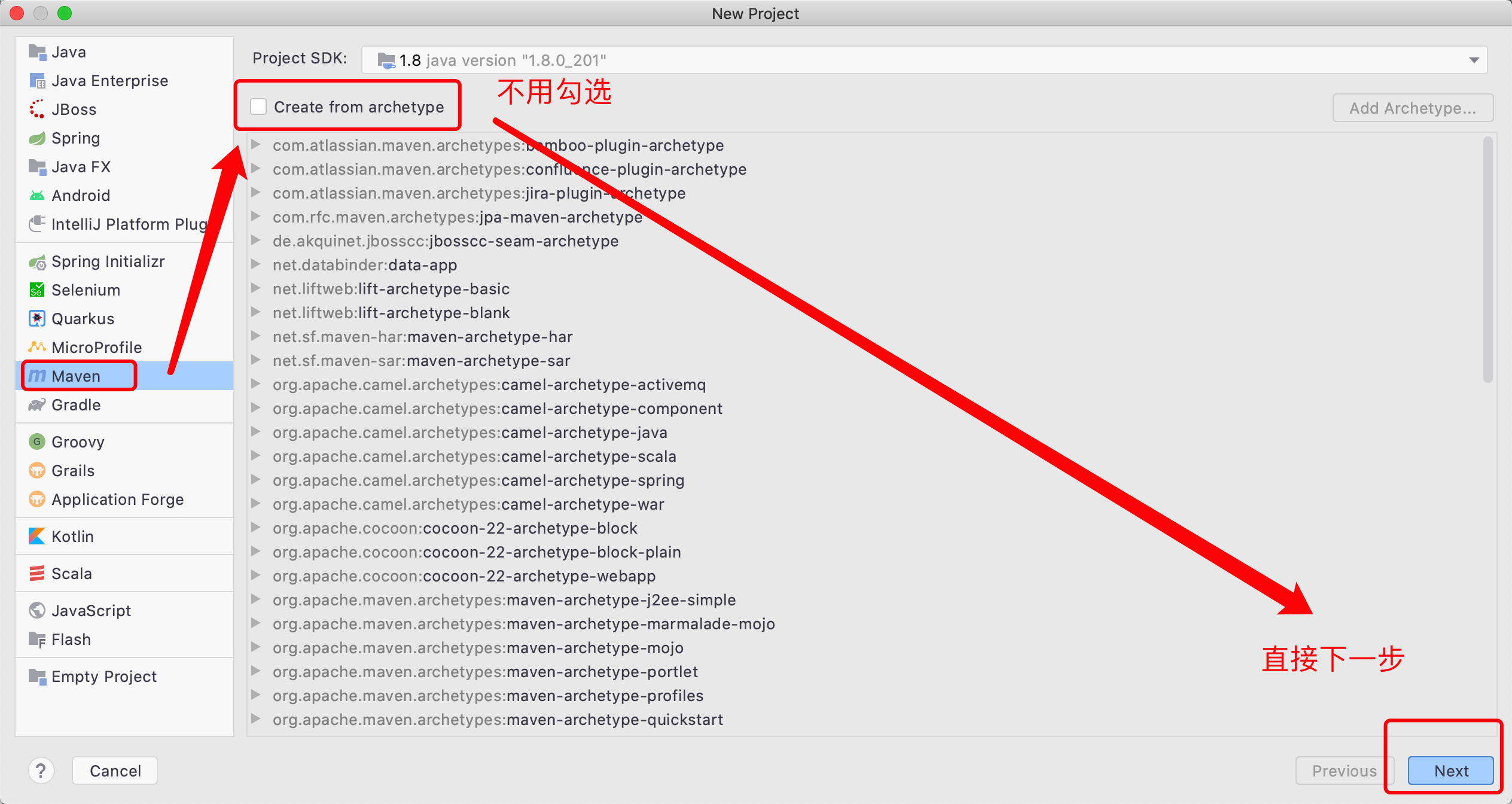
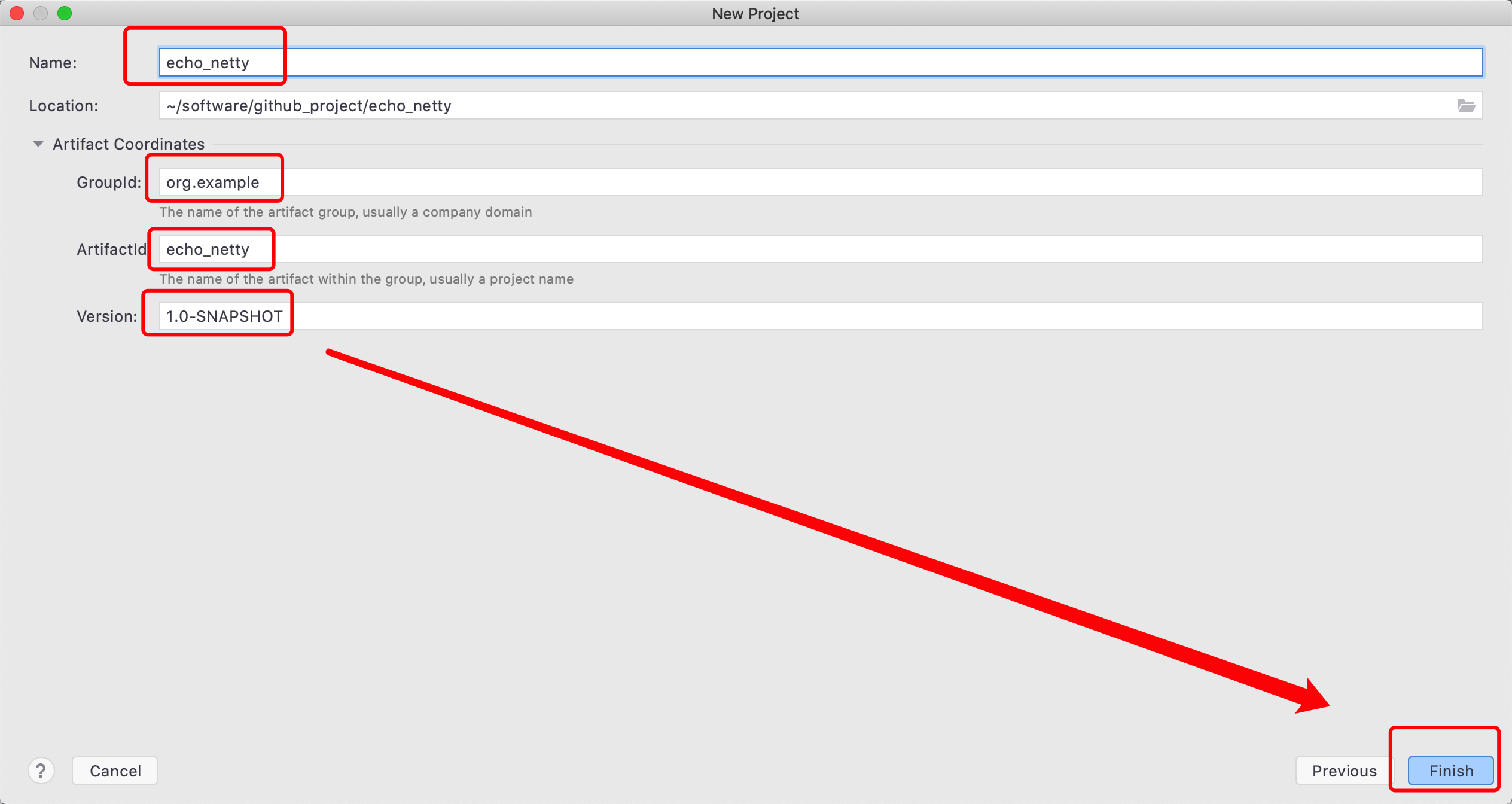
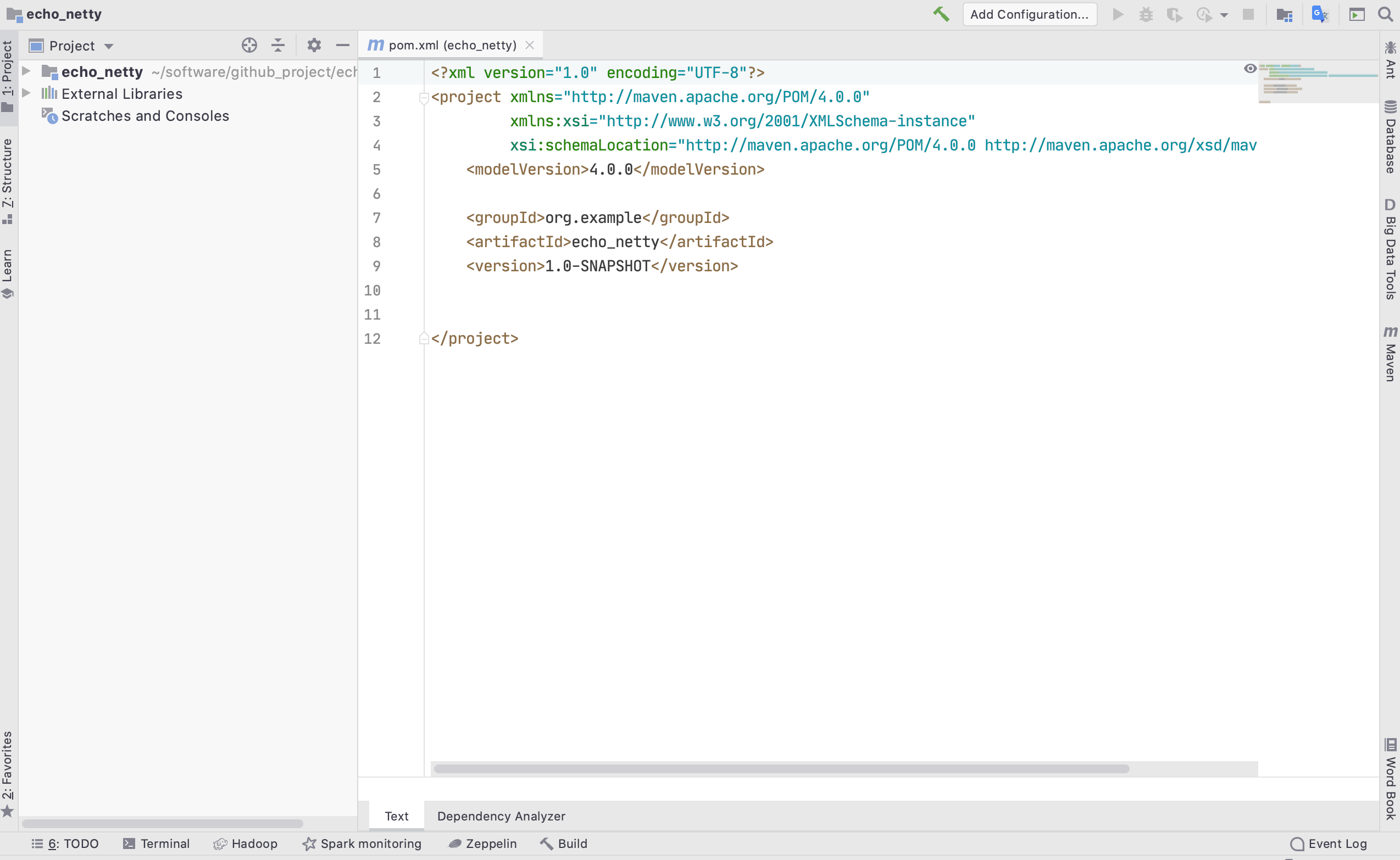
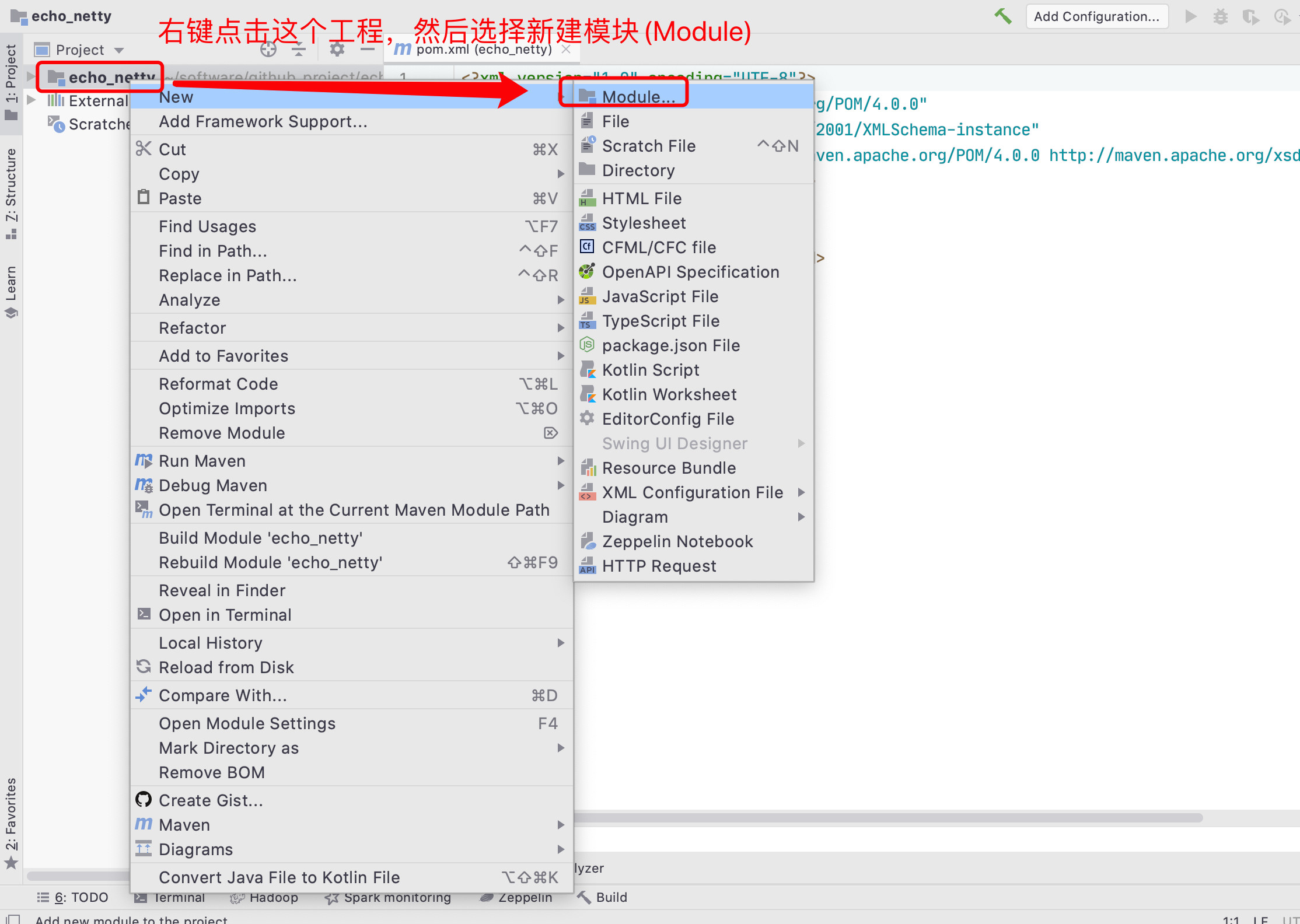
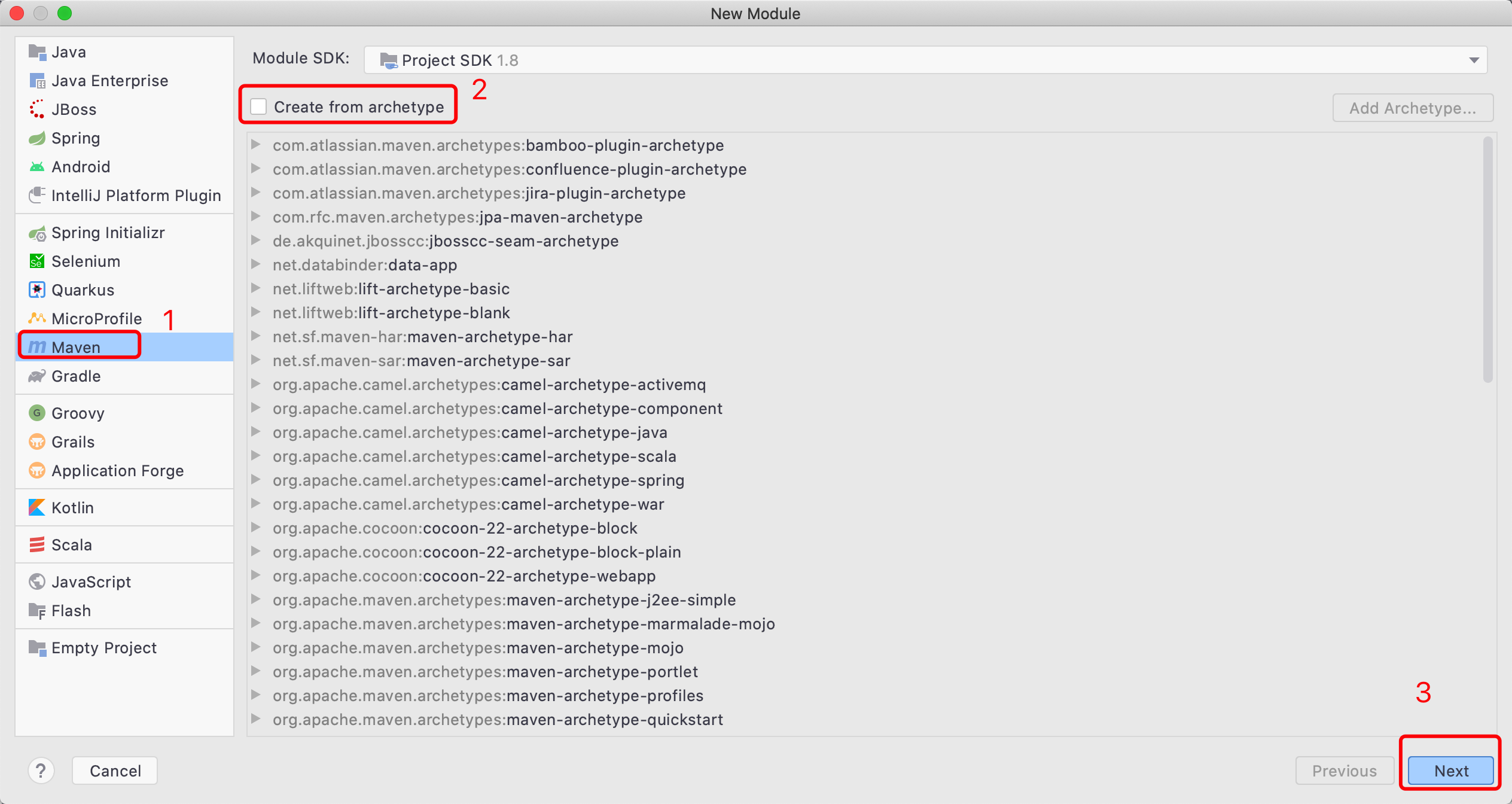
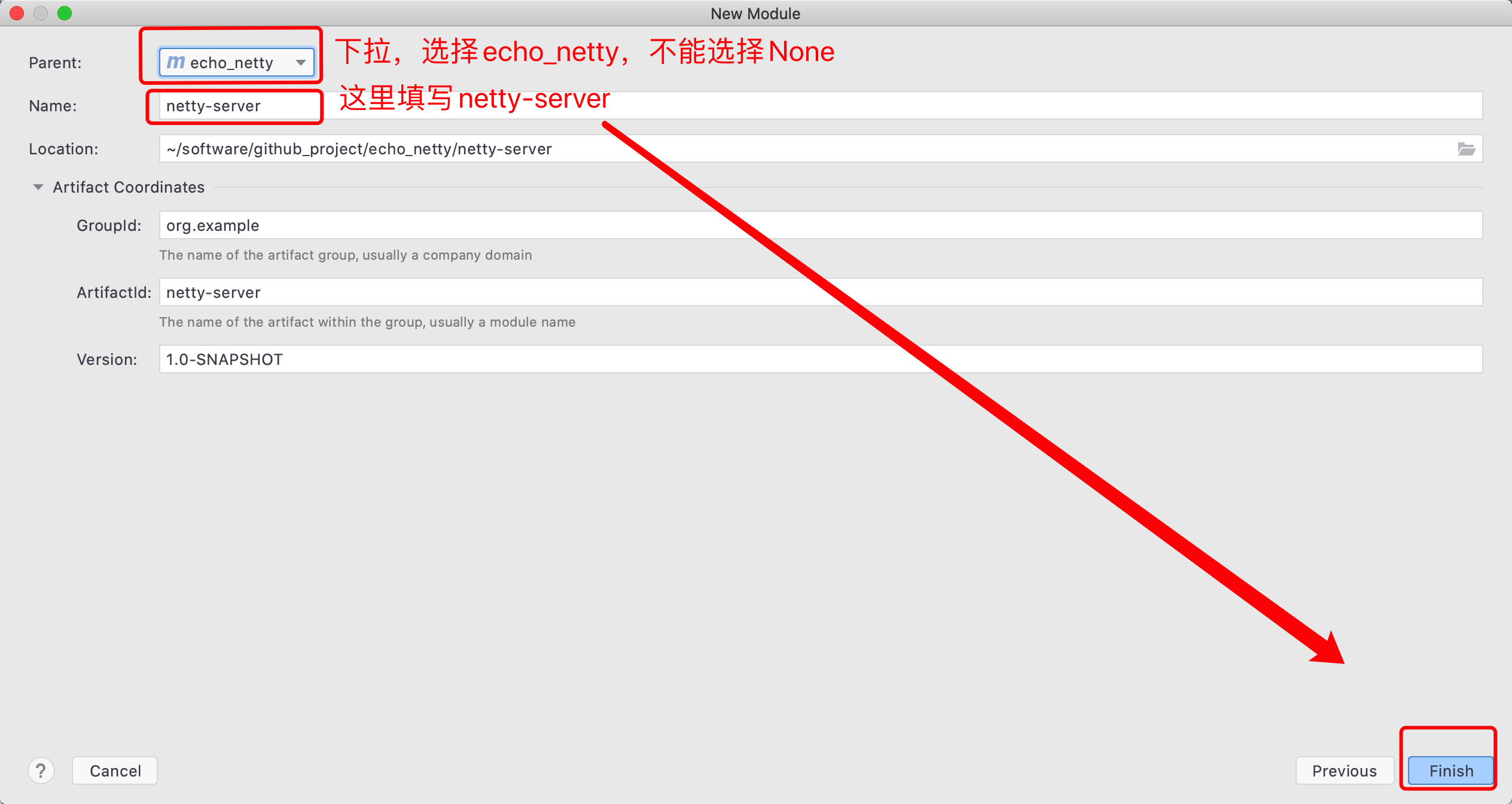

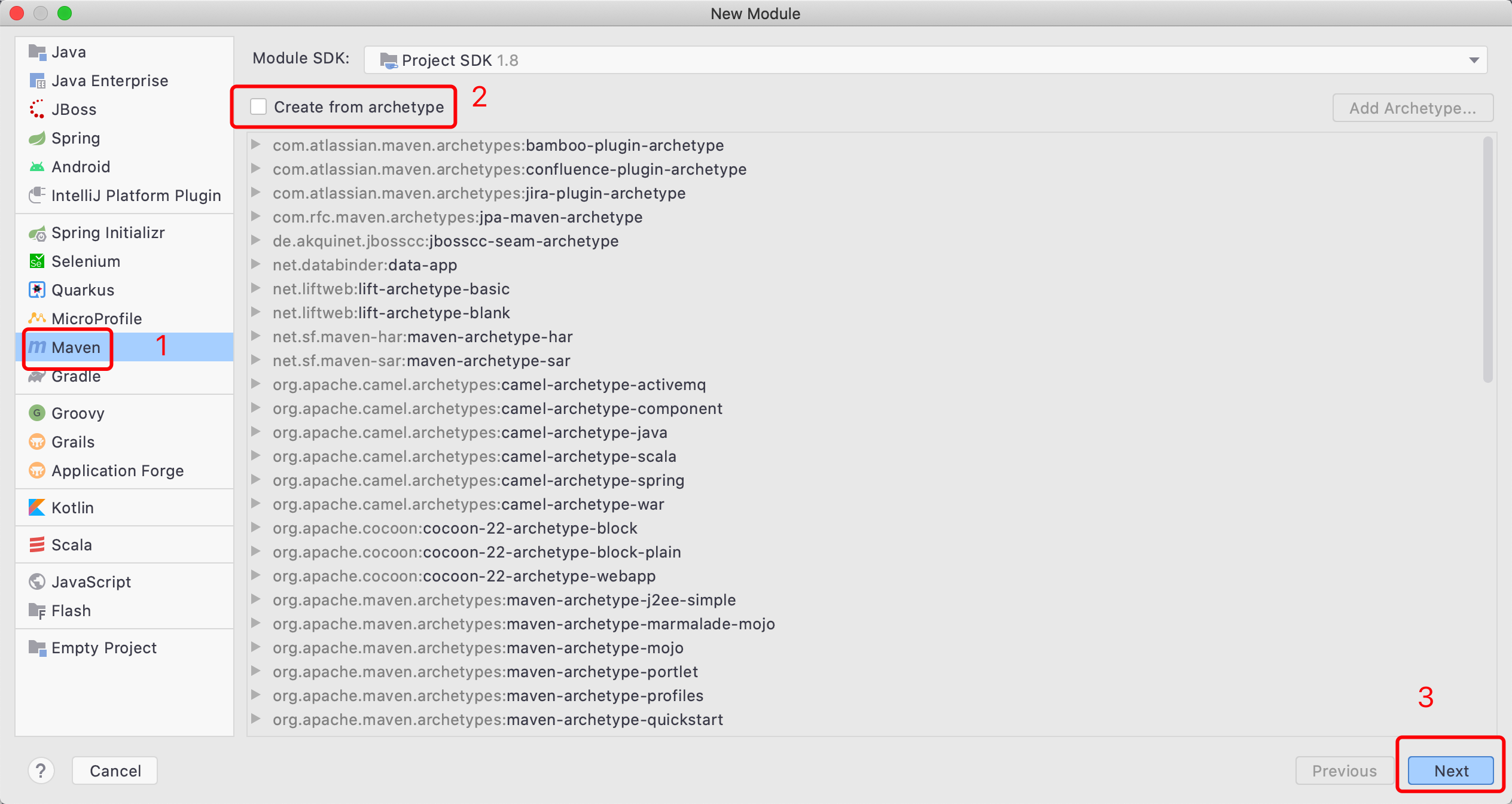

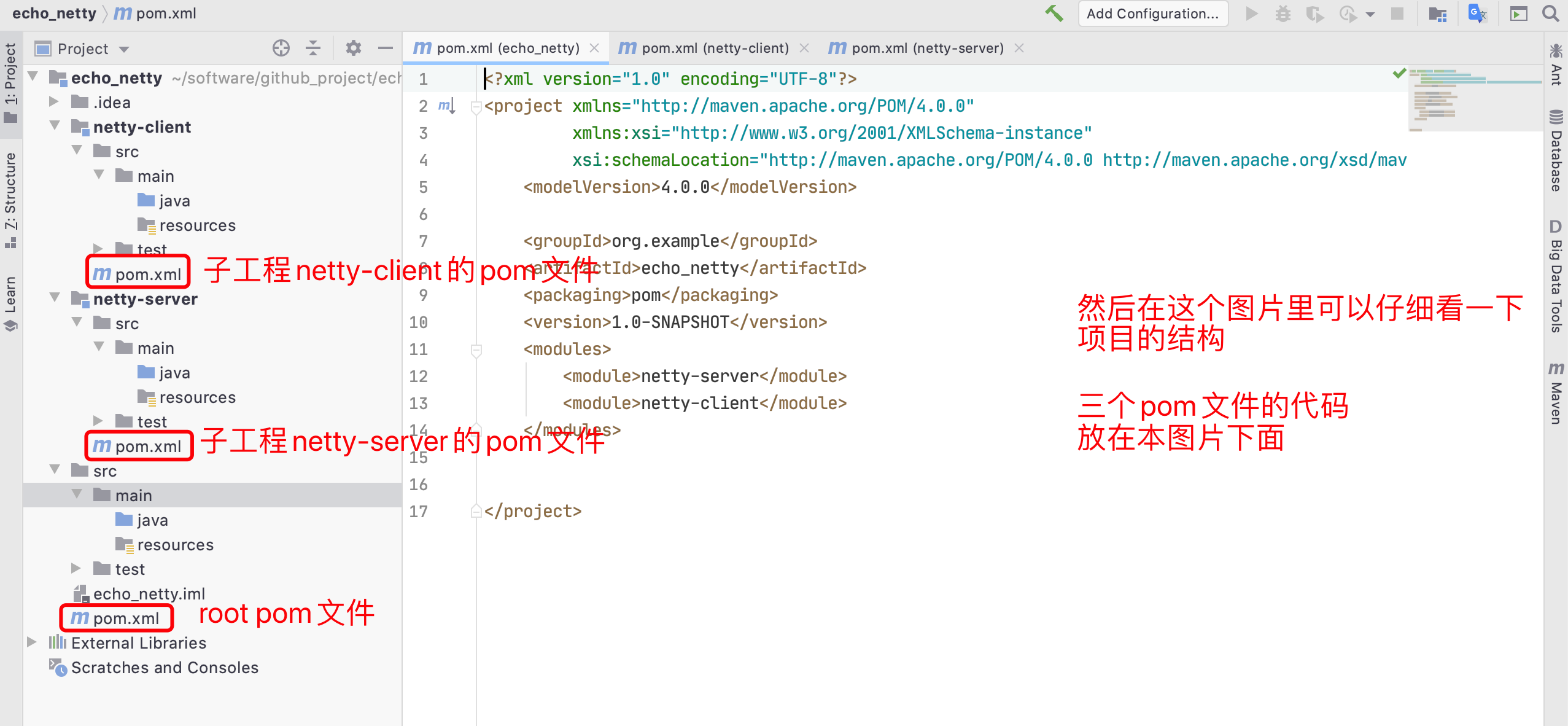
1.1 父节点的pom.xml代码(root pom文件)
1 <?xml version="1.0" encoding="UTF-8"?> 2 <project xmlns="http://maven.apache.org/POM/4.0.0" 3 xmlns:xsi="http://www.w3.org/2001/XMLSchema-instance" 4 xsi:schemaLocation="http://maven.apache.org/POM/4.0.0 http://maven.apache.org/xsd/maven-4.0.0.xsd"> 5 <modelVersion>4.0.0</modelVersion> 6 7 <groupId>org.example</groupId> 8 <artifactId>echo_netty</artifactId> 9 <packaging>pom</packaging> 10 <version>1.0-SNAPSHOT</version> 11 <modules> 12 <module>netty-server</module> 13 <module>netty-client</module> 14 </modules> 15 16 </project>
1.2 子工程netty-server的pom.xml文件代码
1 <?xml version="1.0" encoding="UTF-8"?> 2 <project xmlns="http://maven.apache.org/POM/4.0.0" 3 xmlns:xsi="http://www.w3.org/2001/XMLSchema-instance" 4 xsi:schemaLocation="http://maven.apache.org/POM/4.0.0 http://maven.apache.org/xsd/maven-4.0.0.xsd"> 5 <parent> 6 <artifactId>echo_netty</artifactId> 7 <groupId>org.example</groupId> 8 <version>1.0-SNAPSHOT</version> 9 </parent> 10 <modelVersion>4.0.0</modelVersion> 11 12 <artifactId>netty-server</artifactId> 13 14 15 </project>
1.3 子工程netty-client的pom.xml文件代码
1 <?xml version="1.0" encoding="UTF-8"?> 2 <project xmlns="http://maven.apache.org/POM/4.0.0" 3 xmlns:xsi="http://www.w3.org/2001/XMLSchema-instance" 4 xsi:schemaLocation="http://maven.apache.org/POM/4.0.0 http://maven.apache.org/xsd/maven-4.0.0.xsd"> 5 <parent> 6 <artifactId>echo_netty</artifactId> 7 <groupId>org.example</groupId> 8 <version>1.0-SNAPSHOT</version> 9 </parent> 10 <modelVersion>4.0.0</modelVersion> 11 12 <artifactId>netty-client</artifactId> 13 14 15 </project>
1.4 修改父工程的pom.xml,修改后如下所示:
1 <?xml version="1.0" encoding="UTF-8"?> 2 <project xmlns="http://maven.apache.org/POM/4.0.0" 3 xmlns:xsi="http://www.w3.org/2001/XMLSchema-instance" 4 xsi:schemaLocation="http://maven.apache.org/POM/4.0.0 http://maven.apache.org/xsd/maven-4.0.0.xsd"> 5 <modelVersion>4.0.0</modelVersion> 6 7 <groupId>org.example</groupId> 8 <artifactId>echo_netty</artifactId> 9 <packaging>pom</packaging> 10 <version>1.0-SNAPSHOT</version> 11 <modules> 12 <module>netty-server</module> 13 <module>netty-client</module> 14 </modules> 15 16 <properties> 17 <echo-server.hostname>localhost</echo-server.hostname> 18 <echo-server.port>9999</echo-server.port> 19 </properties> 20 21 <dependencies> 22 <dependency> 23 <groupId>io.netty</groupId> 24 <artifactId>netty-all</artifactId> 25 <version>4.1.10.Final</version> 26 <scope>compile</scope> 27 </dependency> 28 </dependencies> 29 30 <build> 31 <plugins> 32 <plugin> 33 <artifactId>maven-compiler-plugin</artifactId> 34 </plugin> 35 <plugin> 36 <artifactId>maven-failsafe-plugin</artifactId> 37 </plugin> 38 <plugin> 39 <artifactId>maven-surefire-plugin</artifactId> 40 </plugin> 41 <plugin> 42 <groupId>org.codehaus.mojo</groupId> 43 <artifactId>exec-maven-plugin</artifactId> 44 </plugin> 45 </plugins> 46 </build> 47 </project>
1.5 修改netty-server的pom.xml,修改后如下所示:
1 <?xml version="1.0" encoding="UTF-8"?> 2 <project xmlns="http://maven.apache.org/POM/4.0.0" 3 xmlns:xsi="http://www.w3.org/2001/XMLSchema-instance" 4 xsi:schemaLocation="http://maven.apache.org/POM/4.0.0 http://maven.apache.org/xsd/maven-4.0.0.xsd"> 5 <parent> 6 <artifactId>echo_netty</artifactId> 7 <groupId>org.example</groupId> 8 <version>1.0-SNAPSHOT</version> 9 </parent> 10 <modelVersion>4.0.0</modelVersion> 11 12 <artifactId>netty-server</artifactId> 13 14 <build> 15 <plugins> 16 <plugin> 17 <groupId>org.codehaus.mojo</groupId> 18 <artifactId>exec-maven-plugin</artifactId> 19 <executions> 20 <execution> 21 <id>run-server</id> 22 <goals> 23 <goal>java</goal> 24 </goals> 25 </execution> 26 </executions> 27 <configuration> 28 <mainClass>com.echo.server.EchoServer</mainClass> 29 <arguments> 30 <argument>${echo-server.port}</argument> 31 </arguments> 32 </configuration> 33 </plugin> 34 </plugins> 35 </build> 36 37 </project>
1.6 修改netty-client的pom.xml,修改后如下所示:
1 <?xml version="1.0" encoding="UTF-8"?> 2 <project xmlns="http://maven.apache.org/POM/4.0.0" 3 xmlns:xsi="http://www.w3.org/2001/XMLSchema-instance" 4 xsi:schemaLocation="http://maven.apache.org/POM/4.0.0 http://maven.apache.org/xsd/maven-4.0.0.xsd"> 5 <parent> 6 <artifactId>echo_netty</artifactId> 7 <groupId>org.example</groupId> 8 <version>1.0-SNAPSHOT</version> 9 </parent> 10 <modelVersion>4.0.0</modelVersion> 11 12 <artifactId>netty-client</artifactId> 13 14 <build> 15 <plugins> 16 <plugin> 17 <groupId>org.codehaus.mojo</groupId> 18 <artifactId>exec-maven-plugin</artifactId> 19 <executions> 20 <execution> 21 <id>run-server</id> 22 <goals> 23 <goal>java</goal> 24 </goals> 25 </execution> 26 </executions> 27 <configuration> 28 <mainClass>com.echo.client.EchoClient</mainClass> 29 <arguments> 30 <argument>${echo-server.hostname}</argument> 31 <argument>${echo-server.port}</argument> 32 </arguments> 33 </configuration> 34 </plugin> 35 </plugins> 36 </build> 37 38 </project>
2. 开始写netty客户端的代码
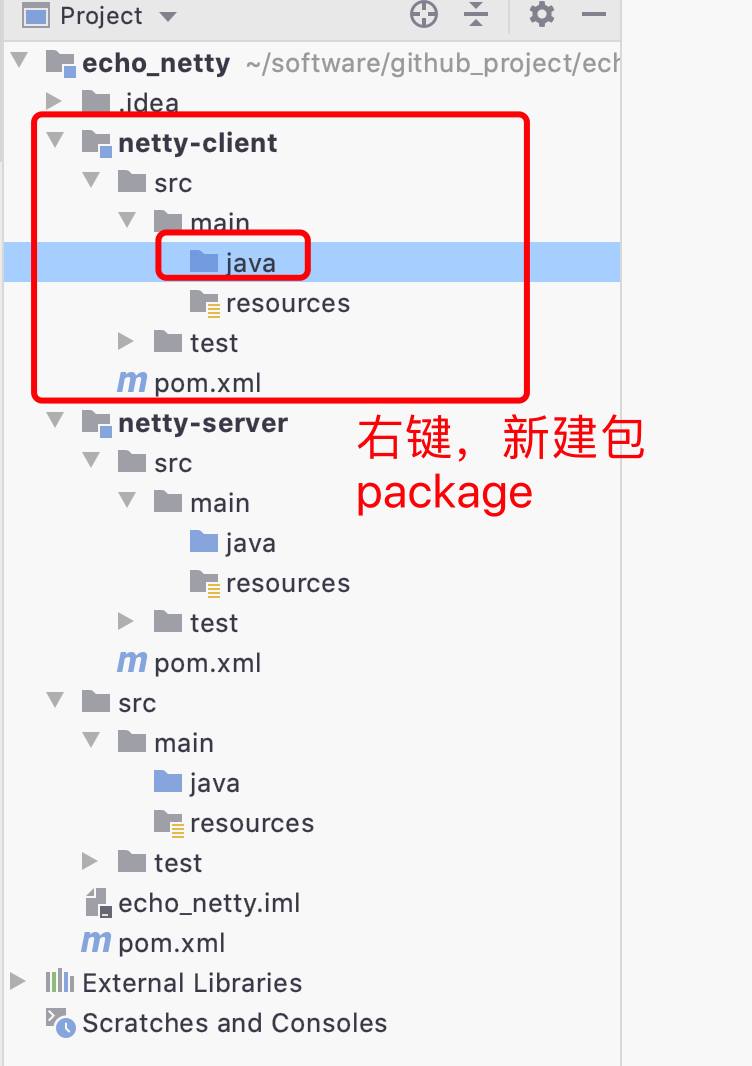
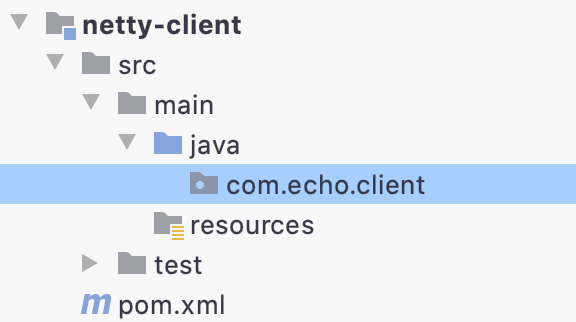
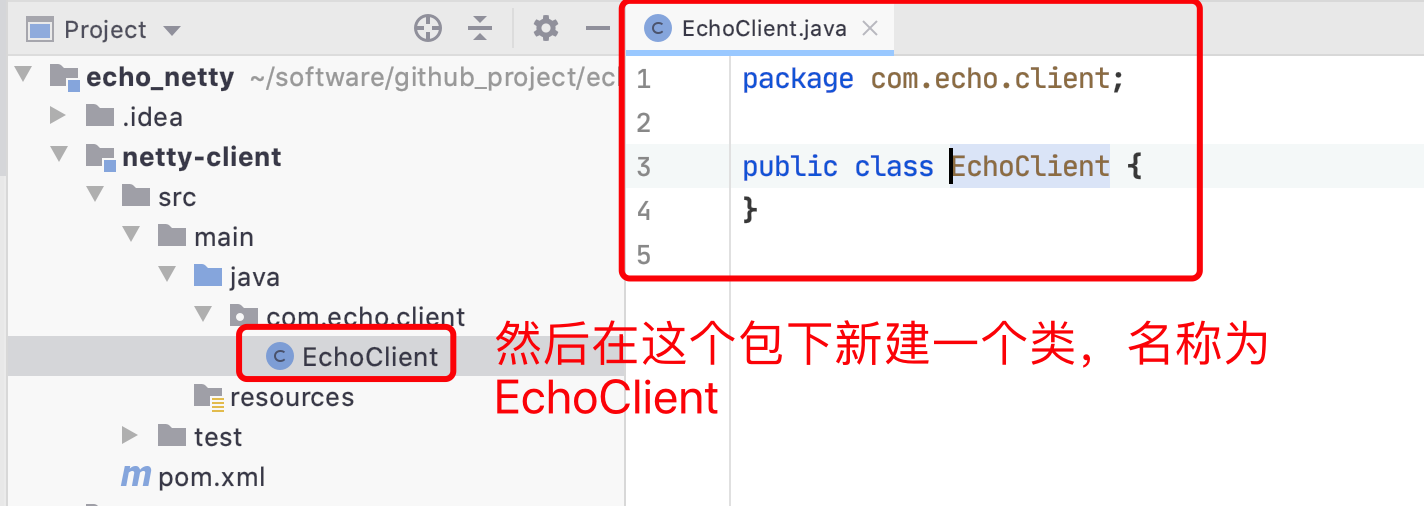


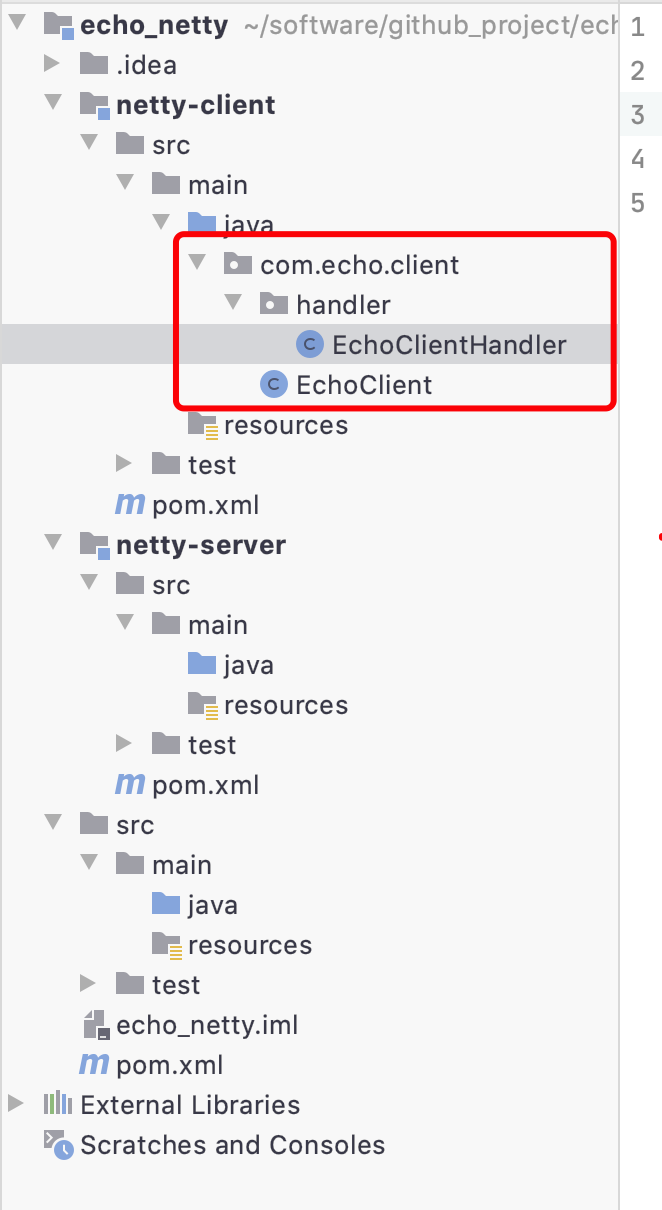
到这里的时候,项目的结构应该是这个样子的,然后让我们修改一下EchoClient.java和EchoClientHandler.java文件的内容,修改后最终代码放在下面,大家请看:
2.1 EchoClient.java的最终代码
1 package com.echo.client; 2 3 import java.net.InetSocketAddress; 4 5 import com.echo.client.handler.EchoClientHandler; 6 import io.netty.bootstrap.Bootstrap; 7 import io.netty.channel.ChannelFuture; 8 import io.netty.channel.ChannelInitializer; 9 import io.netty.channel.EventLoopGroup; 10 import io.netty.channel.nio.NioEventLoopGroup; 11 import io.netty.channel.socket.SocketChannel; 12 import io.netty.channel.socket.nio.NioSocketChannel; 13 14 public class EchoClient { 15 16 private final String host; 17 private final int port; 18 19 public EchoClient(String host, int port) { 20 this.host = host; 21 this.port = port; 22 } 23 24 public static void main(String[] args) throws Exception { 25 if (args.length != 2) { 26 System.err.println( 27 "Usage: " + EchoClient.class.getSimpleName() + 28 " <host> <port>"); 29 return; 30 } 31 String host = args[0]; 32 int port = Integer.parseInt(args[1]); 33 new EchoClient(host, port).start(); 34 } 35 36 public void start() throws Exception { 37 EventLoopGroup group = new NioEventLoopGroup(); 38 try { 39 Bootstrap b = new Bootstrap(); 40 b.group(group) 41 .channel(NioSocketChannel.class) 42 .remoteAddress(new InetSocketAddress(host, port)) 43 .handler(new ChannelInitializer<SocketChannel>() { 44 45 @Override 46 protected void initChannel(SocketChannel ch) throws Exception { 47 ch.pipeline().addLast(new EchoClientHandler()); 48 } 49 50 }); 51 ChannelFuture f = b.connect().sync(); 52 f.channel().closeFuture().sync(); 53 } finally { 54 group.shutdownGracefully().sync(); 55 } 56 } 57 58 }
2.2 EchoClientHandler.java的最终代码
1 package com.echo.client.handler; 2 3 import io.netty.buffer.ByteBuf; 4 import io.netty.buffer.Unpooled; 5 import io.netty.channel.ChannelHandler.Sharable; 6 import io.netty.channel.ChannelHandlerContext; 7 import io.netty.channel.SimpleChannelInboundHandler; 8 import io.netty.util.CharsetUtil; 9 10 @Sharable 11 public class EchoClientHandler extends SimpleChannelInboundHandler<ByteBuf> { 12 13 @Override 14 public void channelActive(ChannelHandlerContext ctx) throws Exception { 15 ctx.writeAndFlush(Unpooled.copiedBuffer("Netty rocks!", CharsetUtil.UTF_8)); 16 } 17 18 @Override 19 protected void channelRead0(ChannelHandlerContext ctx, ByteBuf in) throws Exception { 20 System.out.println("Client received: " + in.toString(CharsetUtil.UTF_8)); 21 } 22 23 @Override 24 public void exceptionCaught(ChannelHandlerContext ctx, Throwable cause) throws Exception { 25 cause.printStackTrace(); 26 ctx.close(); 27 } 28 29 }
到这的时候,如果有报错的话,一般是maven没有刷新导致的。
解决方法是,打开父工程的pom.xml ,然后点击idea的右侧的maven刷新按钮,如下图所示
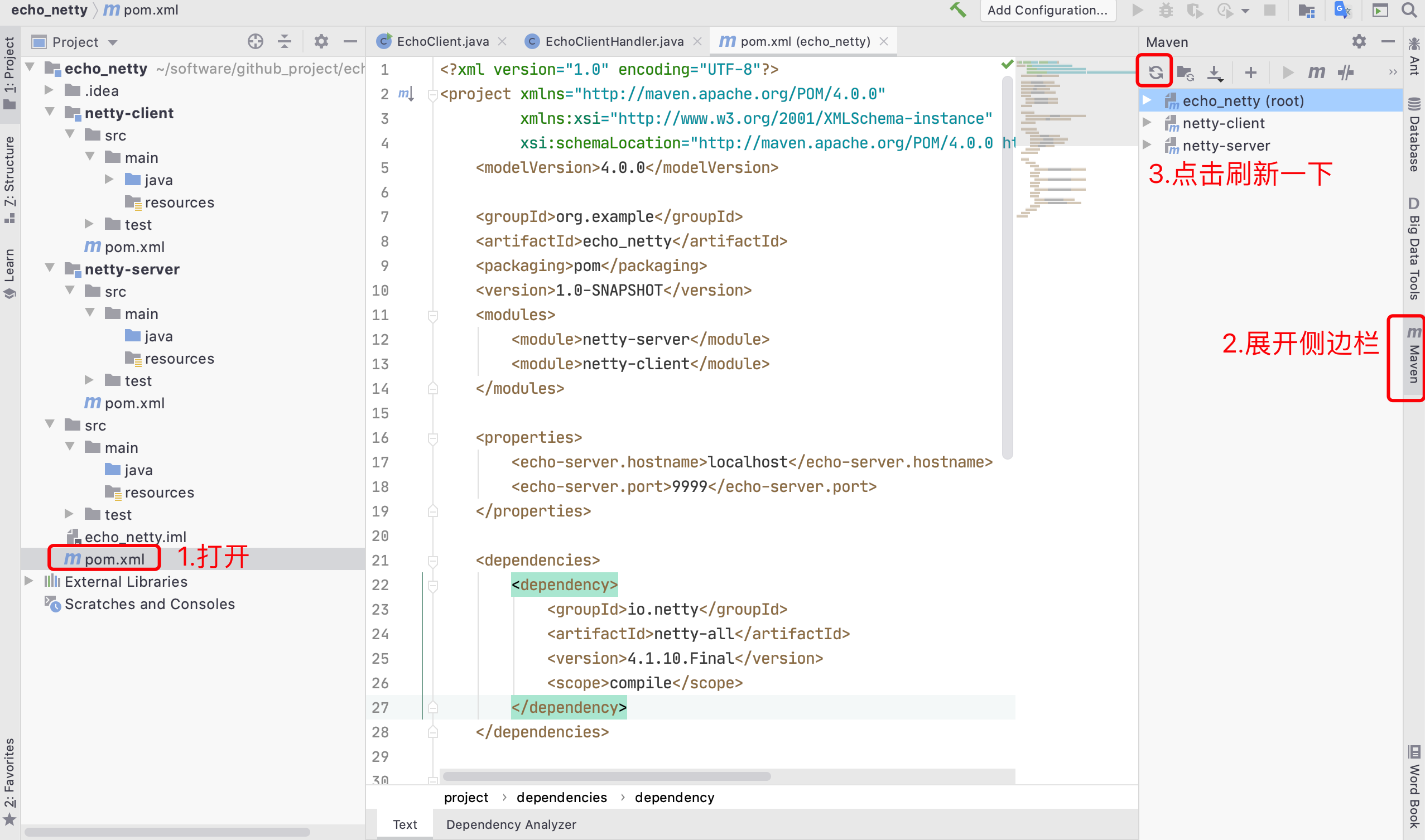
至此,EchoClient端的代码就写好了。暂时先不启动,先写好EchoServer,再一起启动。下面介绍EchoServer端的代码。
3. 开始写netty服务端的代码
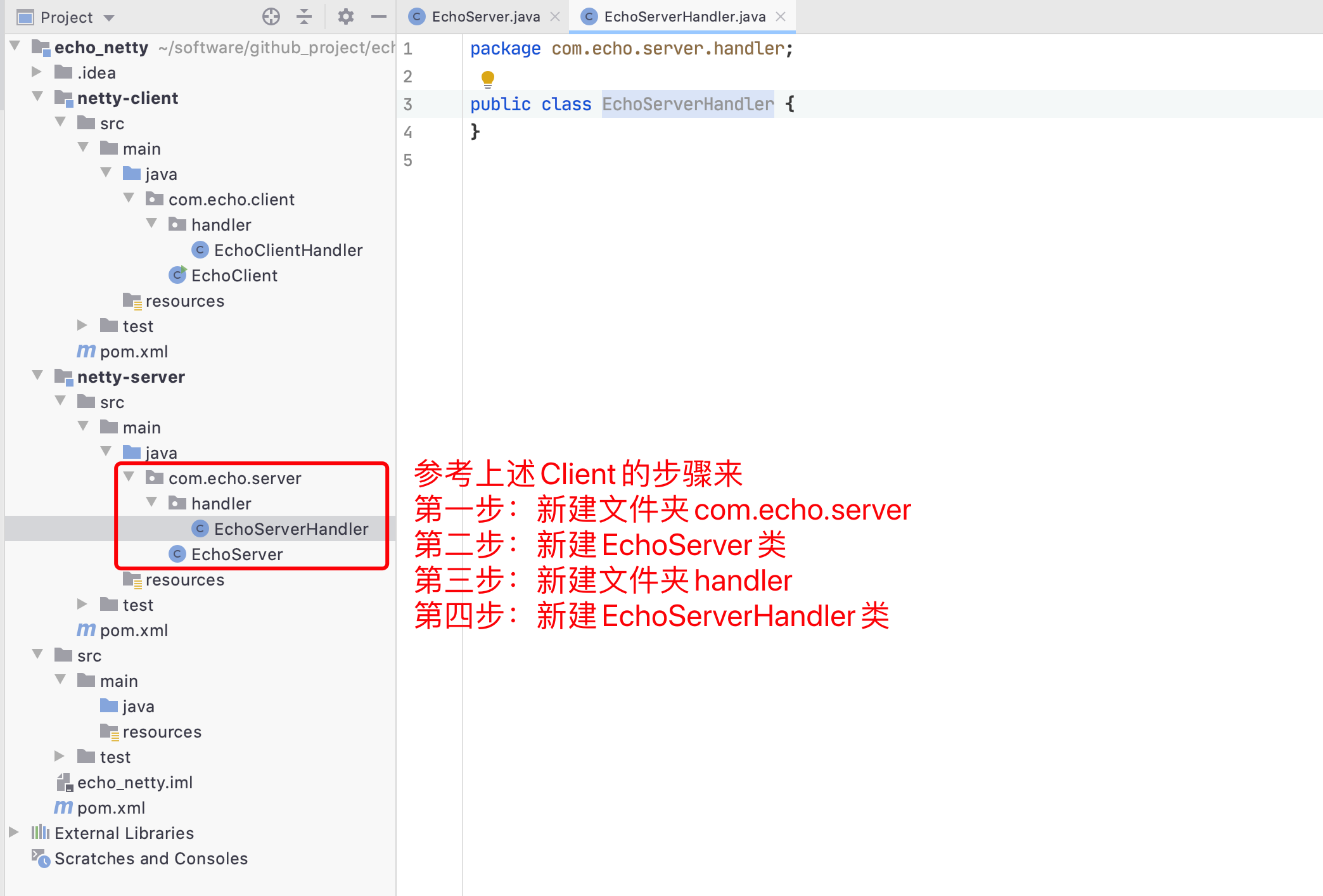
3.2 修改EchoServer.java文件代码,修改后最终代码如下:
1 package com.echo.server; 2 3 import java.net.InetSocketAddress; 4 5 import com.echo.server.handler.EchoServerHandler; 6 import io.netty.bootstrap.ServerBootstrap; 7 import io.netty.channel.ChannelFuture; 8 import io.netty.channel.ChannelInitializer; 9 import io.netty.channel.EventLoopGroup; 10 import io.netty.channel.nio.NioEventLoopGroup; 11 import io.netty.channel.socket.SocketChannel; 12 import io.netty.channel.socket.nio.NioServerSocketChannel; 13 14 public class EchoServer { 15 16 private final int port; 17 18 public EchoServer(int port) { 19 this.port = port; 20 } 21 22 public void start() throws Exception { 23 final EchoServerHandler serverHandler = new EchoServerHandler(); 24 EventLoopGroup group = new NioEventLoopGroup(); 25 try { 26 ServerBootstrap b = new ServerBootstrap(); 27 b.group(group) 28 .channel(NioServerSocketChannel.class) 29 .localAddress(new InetSocketAddress(port)) 30 .childHandler(new ChannelInitializer<SocketChannel>() { 31 32 @Override 33 protected void initChannel(SocketChannel ch) throws Exception { 34 ch.pipeline().addLast(serverHandler); 35 } 36 }); 37 // 此处绑定服务器,并等待绑定完成。对sync()方法的调用将导致当前Thread阻塞,直到绑定完成 38 ChannelFuture f = b.bind().sync(); 39 // 由于调用了sync()方法,程序将会阻塞等待,直到服务器的Channel关闭 40 f.channel().closeFuture().sync(); 41 } finally { 42 group.shutdownGracefully().sync(); 43 } 44 } 45 46 public static void main(String[] args) throws Exception { 47 if (args.length != 1) { 48 System.err.println( 49 "Usage: " + EchoServer.class.getSimpleName() + " <port>" 50 ); 51 return; 52 } 53 int port = Integer.parseInt(args[0]); 54 new EchoServer(port).start(); 55 } 56 57 }
3.3 修改EchoServerHandler.java文件代码,修改后最终代码如下:
1 package com.echo.server.handler; 2 3 import io.netty.buffer.ByteBuf; 4 import io.netty.buffer.Unpooled; 5 import io.netty.channel.ChannelHandler.Sharable; 6 import io.netty.channel.ChannelFutureListener; 7 import io.netty.channel.ChannelHandlerContext; 8 import io.netty.channel.ChannelInboundHandlerAdapter; 9 import io.netty.util.CharsetUtil; 10 11 // @Sharable标示一个ChannelHandler可以被多个Channel安全共享 12 @Sharable 13 public class EchoServerHandler extends ChannelInboundHandlerAdapter { 14 15 @Override 16 public void channelRead(ChannelHandlerContext ctx, Object msg) throws Exception { 17 ByteBuf in = (ByteBuf) msg; 18 System.out.println( 19 "Server received: " + in.toString(CharsetUtil.UTF_8)); 20 // 将接收到的消息写给发送者,即客户端,而不冲刷出站消息 21 ctx.write(in); 22 } 23 24 @Override 25 public void channelReadComplete(ChannelHandlerContext ctx) throws Exception { 26 // 将未决消息冲刷到远程节点,并且关闭该Channel 27 ctx.writeAndFlush(Unpooled.EMPTY_BUFFER) 28 .addListener(ChannelFutureListener.CLOSE); 29 } 30 31 @Override 32 public void exceptionCaught(ChannelHandlerContext ctx, Throwable cause) throws Exception { 33 cause.printStackTrace(); 34 ctx.close(); 35 } 36 37 }
至此,所有的代码已经写好,下一步进行运行测试
4.运行代码
4.1 打包代码
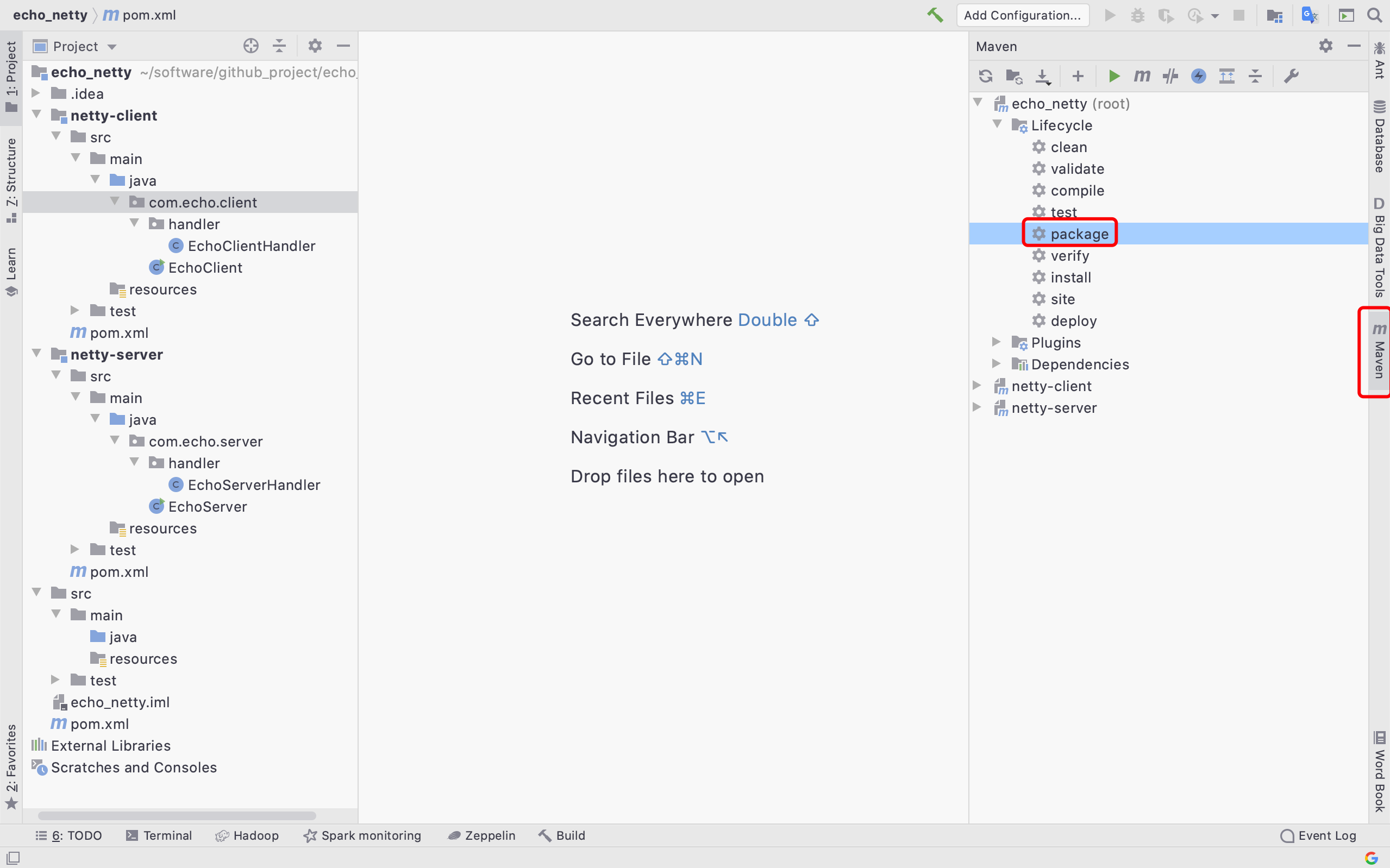
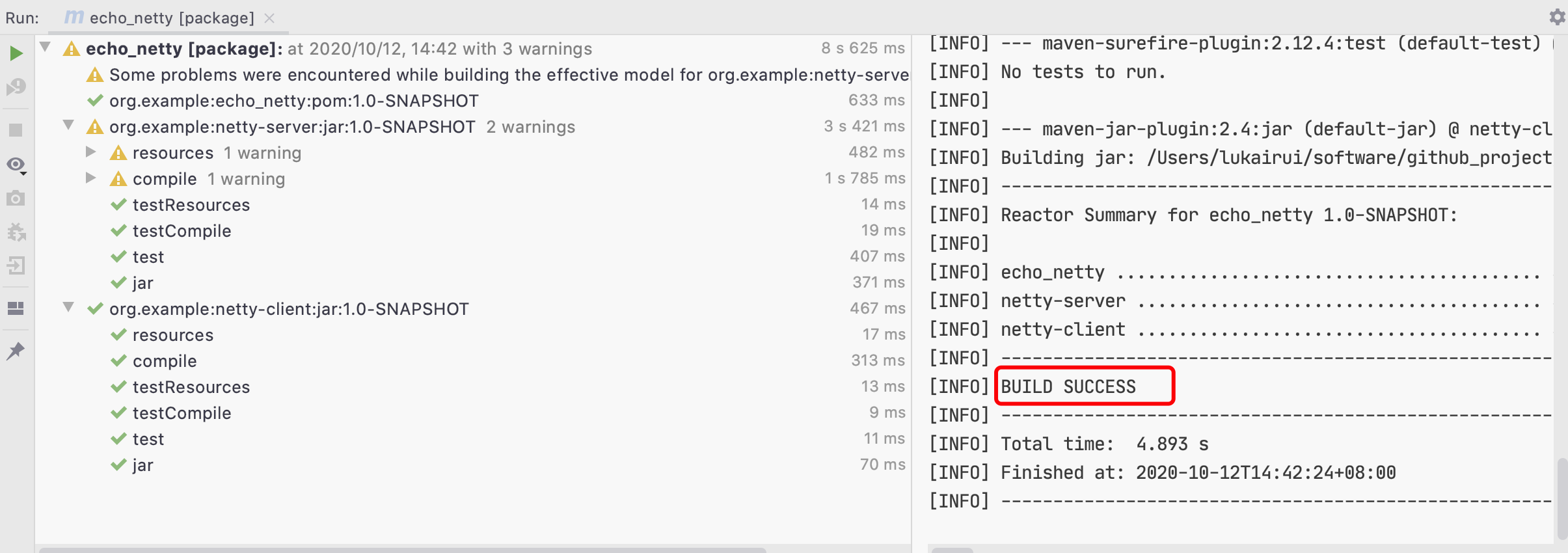
当出现BUILD SUCCESS的时候,代表代码已经打包好了。
4.2 运行server端
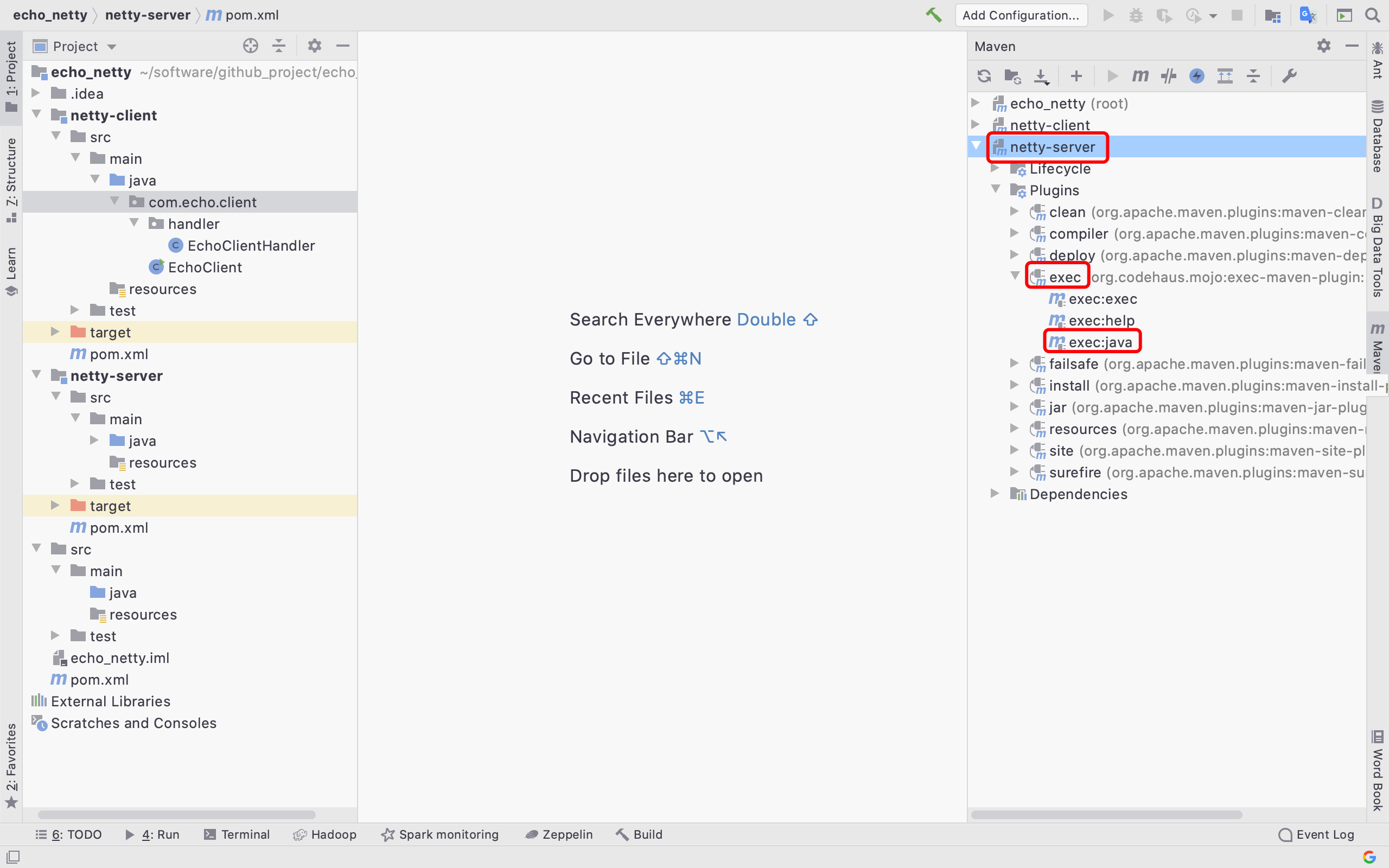

出现一直在转圈的时候,代表server端启动成功了
4.3 运行client端
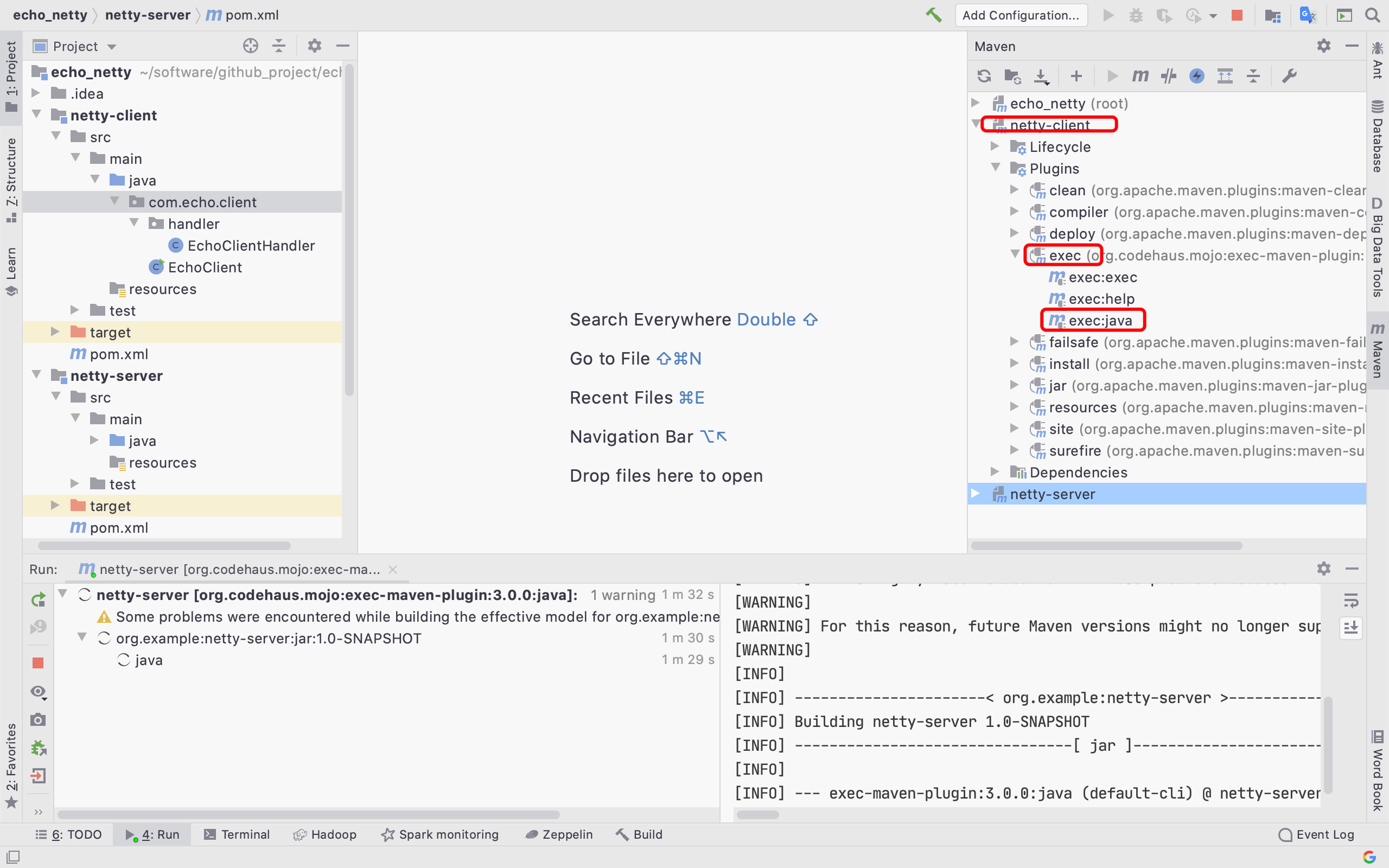
双击运行client端,然后稍等片刻,会发现下图已经出现了
Client received: Netty rocks!
这一行字。说明客户端和服务端通信成功。
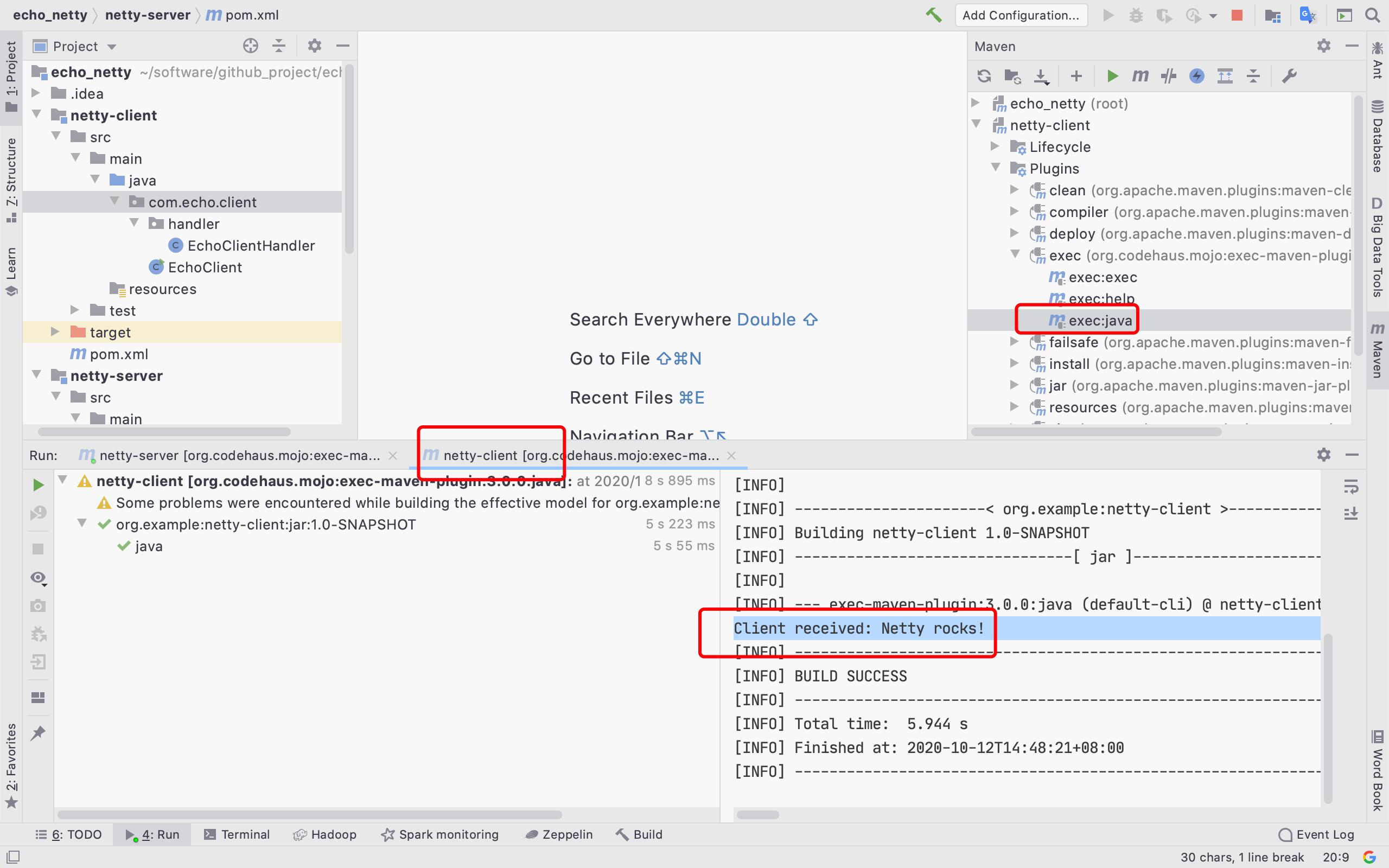
接着看一下server端打印的输出,如下图:
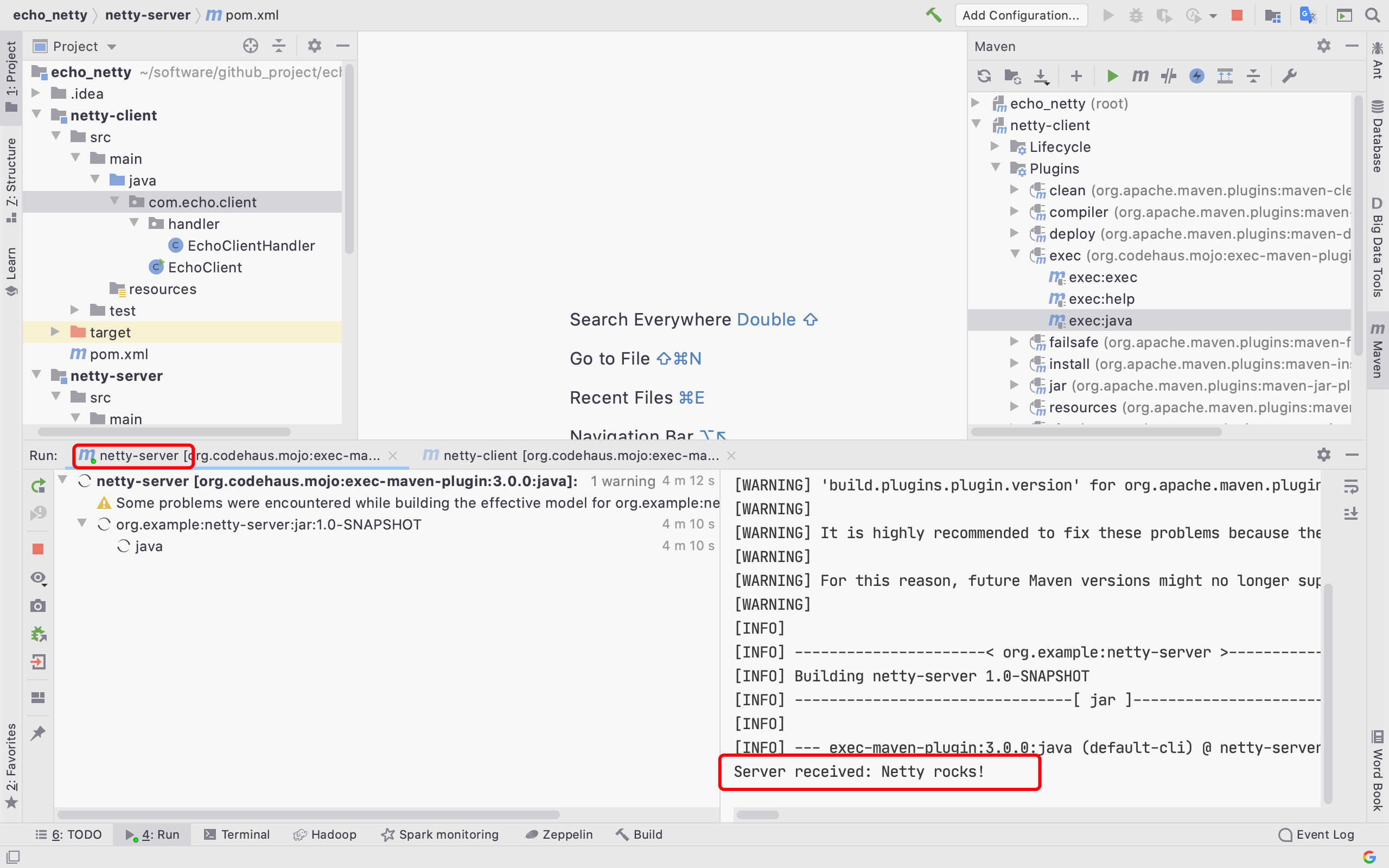
可以看到,server端已经输出了从客户端收到的消息!!!
至此,所有的演示都结束了,大家自己动手进行实践吧。


